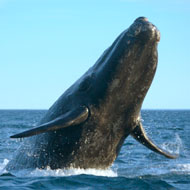Body size could indicate collapse of a species

The team looked at data on whales and found significant declines in body size.
Research into the collapse of commercially hunted whale populations has revealed that there were warning signs, 40 years prior to the massive decline in numbers. The study was conducted by scientists from the Universities of Zurich and Tasmania, with the aim to help develop new methods of conservation for other protected species.
The team analysed records, gathered throughout the commercial whaling era of the twentieth century and assembled by the International Whaling Committee (IWC), to look at the effects of overharvesting. Overharvesting is a major issue for many marine species, with some populations declining to such an extent, they never recover.
Past studies, looking at the precursors to the collapse of a species, suggest major shifts in average body size, as well as instability in population numbers to be symptomatic of an impending collapse. These studies, however, were not indicative of changes demonstrated by wild populations, therefore the team began analysing data taken from harvested whales, from the 1900s onwards.
Christopher Clements, ecologist and team leader from the University of Zurich, said: “We looked at data on blue, fin, sei and sperm whales and found significant declines in body size, with sperm whales taken in the 1980s four metres shorter on average than those in 1905. This means that warning signals were detectable up to 40 years before a population collapse”.
Clements went on to say: “Our technique could be used to help provide other species of conservation concern. Moreover, it could allow interventions to be put in place to stop this happening.”
A key example of a time this research could have benefited a species was in the twentieth century, when whales were intensely over-harvested for oil, blubber and meat. This led to a major collapse in the population, which has never been recovered. The research may help scientists and conservationists track certain biological attributes of endangered species, alerting them to the potential demise of a population.



 The BSAVA has opened submissions for the BSAVA Clinical Research Abstracts 2026.
The BSAVA has opened submissions for the BSAVA Clinical Research Abstracts 2026.